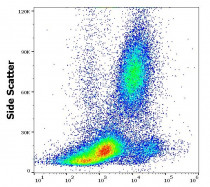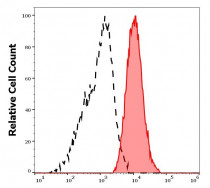ARG62932
anti-CD80 antibody [16-10A1]
anti-CD80 antibody [16-10A1] for CyTOF®-candidate,Flow cytometry,Functional study,ICC/IF,IHC-Frozen sections,Immunoprecipitation and Mouse,Dog
Developmental Biology antibody; Immune System antibody
Overview
| Product Description | Hamster Monoclonal antibody [16-10A1] recognizes CD80 |
|---|---|
| Tested Reactivity | Ms, Dog |
| Tested Application | CyTOF®-candidate, FACS, FuncSt, ICC/IF, IHC-Fr, IP |
| Specificity | The clone 16-10A1 reacts with CD80 (B7-1), a 60 kDa single chain type I glycoprotein of immunoglobulin supergene family, expressed on professional antigen-presenting cells, such as dendritic cells, macrophages or activated B lymphocytes. |
| Host | Hamster |
| Clonality | Monoclonal |
| Clone | 16-10A1 |
| Isotype | IgG2 |
| Target Name | CD80 |
| Antigen Species | Mouse |
| Immunogen | Mouse CD80-transfected CHO cell line. |
| Conjugation | Un-conjugated |
| Alternate Names | B7.1; CTLA-4 counter-receptor B7.1; CD28LG; T-lymphocyte activation antigen CD80; B7-1; CD28LG1; B7; LAB7; Activation B7-1 antigen; CD antigen CD80; BB1 |
Application Instructions
| Application Suggestion |
|
||||||||||||||
|---|---|---|---|---|---|---|---|---|---|---|---|---|---|---|---|
| Application Note | Functional study: Functions as blocking. * The dilutions indicate recommended starting dilutions and the optimal dilutions or concentrations should be determined by the scientist. |
Properties
| Form | Liquid |
|---|---|
| Purification | Purified from hybridoma culture supernatant by protein-A affinity chromatography. |
| Purity | > 95% (by SDS-PAGE) |
| Buffer | PBS (pH 7.4) and 15 mM Sodium azide |
| Preservative | 15 mM Sodium azide |
| Concentration | 1 mg/ml |
| Storage Instruction | For continuous use, store undiluted antibody at 2-8°C for up to a week. For long-term storage, aliquot and store at -20°C or below. Storage in frost free freezers is not recommended. Avoid repeated freeze/thaw cycles. Suggest spin the vial prior to opening. The antibody solution should be gently mixed before use. |
| Note | For laboratory research only, not for drug, diagnostic or other use. |
Bioinformation
| Database Links |
Swiss-port # Q00609 Mouse T-lymphocyte activation antigen CD80 |
|---|---|
| Gene Symbol | Cd80 |
| Gene Full Name | CD80 antigen |
| Background | CD80 (B7-1) and CD86 (B7-2) are ligands of T cell critical costimulatory molecule CD28 and of an inhibitory receptor CTLA-4 (CD152). The both B7 molecules are expressed on professional antigen-presenting cells and are essential for T cell activation, the both molecules can also substitute for each other in this process. The question what are the differences in CD80 and CD86 competency has not been fully elucidated yet; there are still conflicts in results about their respective roles in initiation or sustaining of the T cell immune response. |
| Function | Involved in the costimulatory signal essential for T lymphocytes activation. T-cell proliferation and cytokine production is induced by the binding of CD28 or CTLA-4 to this receptor. [UniProt] |
| Highlight | Related products: CD80 antibodies; CD80 ELISA Kits; Anti-Hamster IgG secondary antibodies; Related news: CyTOF-candidate Antibodies |
| Research Area | Developmental Biology antibody; Immune System antibody |
| Calculated MW | 33 kDa |
Images (2) Click the Picture to Zoom In
-
ARG62932 anti-CD80 antibody [16-10A1] FACS image
Flow Cytometry: Murine peripheral whole blood stained with ARG62932 anti-CD80 antibody [16-10A1] at 2 µg/ml dilution, followed by APC-conjugated Goat anti-Mouse antibody.
-
ARG62932 anti-CD80 antibody [16-10A1] FACS image
Flow Cytometry: Separation of murine CD80 positive monocytes (red-filled) from CD80 negative lymphocytes (black-dashed). Murine peritoneal fluid cells stained with ARG62932 anti-CD80 antibody [16-10A1] at 2 µg/ml dilution, followed by APC-conjugated Goat anti-Mouse antibody.
Clone References









